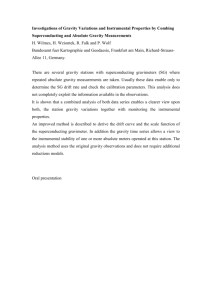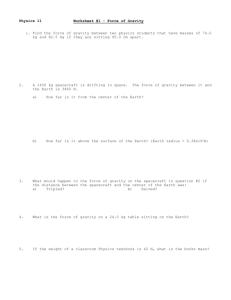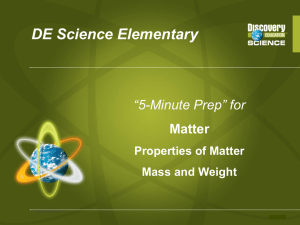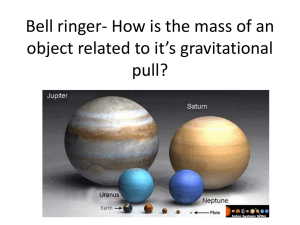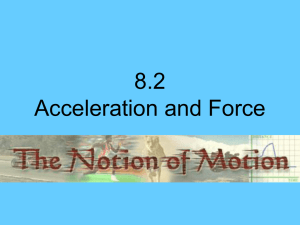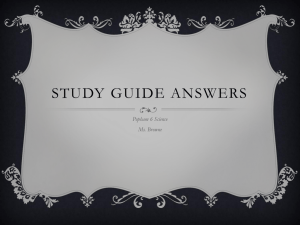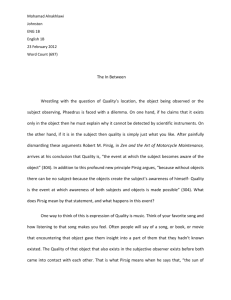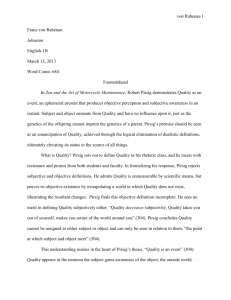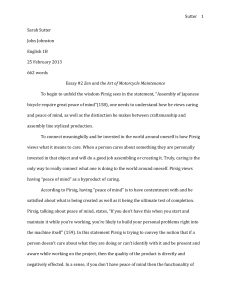docx
advertisement
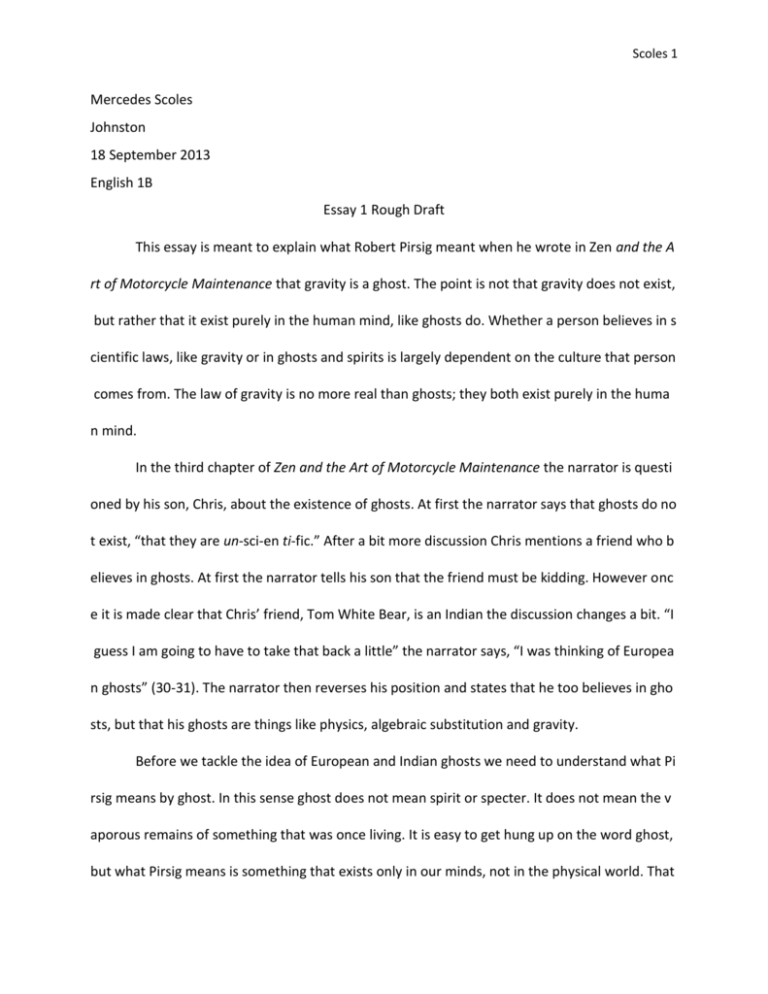
Scoles 1 Mercedes Scoles Johnston 18 September 2013 English 1B Essay 1 Rough Draft This essay is meant to explain what Robert Pirsig meant when he wrote in Zen and the A rt of Motorcycle Maintenance that gravity is a ghost. The point is not that gravity does not exist, but rather that it exist purely in the human mind, like ghosts do. Whether a person believes in s cientific laws, like gravity or in ghosts and spirits is largely dependent on the culture that person comes from. The law of gravity is no more real than ghosts; they both exist purely in the huma n mind. In the third chapter of Zen and the Art of Motorcycle Maintenance the narrator is questi oned by his son, Chris, about the existence of ghosts. At first the narrator says that ghosts do no t exist, “that they are un-sci-en ti-fic.” After a bit more discussion Chris mentions a friend who b elieves in ghosts. At first the narrator tells his son that the friend must be kidding. However onc e it is made clear that Chris’ friend, Tom White Bear, is an Indian the discussion changes a bit. “I guess I am going to have to take that back a little” the narrator says, “I was thinking of Europea n ghosts” (30-31). The narrator then reverses his position and states that he too believes in gho sts, but that his ghosts are things like physics, algebraic substitution and gravity. Before we tackle the idea of European and Indian ghosts we need to understand what Pi rsig means by ghost. In this sense ghost does not mean spirit or specter. It does not mean the v aporous remains of something that was once living. It is easy to get hung up on the word ghost, but what Pirsig means is something that exists only in our minds, not in the physical world. That Scoles 2 is just what he says, the “law of gravity exists nowhere except in people’s heads! It’s a ghost!”( 33). In this sense both the idea of a spirit or specter and the idea of the law of gravity can be gh osts. Now you may say that the law of gravity is not a ghost. You may that it does exist, that you can prove it. To do so you may drop a pen. As it falls you exclaim “see there is gravity!” But, wh at we see is not gravity. To understand the difference between a pen falling and gravity we need to differentiate between a phenomenon and the explanation of a phenomenon. When we talk about gravity wh at we are talking about the law of gravity. The law of gravity is an abstract idea that can exist on ly in our minds. The pen dropping is a phenomenon, and the law of gravity explains that pheno menon. Without a mind to ponder the explanation of something falling only the phenomenon would exist. When Pirsig says “The law of gravity and gravity itself did not exist before Isaac Ne wton” what he means is that the explanation of why objects fall to the ground as explained by Newton did not exist before he thought of it(32). His explanation may be correct; I think it is ver y likely correct, I believe it. That the explanation is true does not mean that the explanation has matter or energy. The explanation is an abstract idea. It is easy to confuse the explanation of a phenomenon and the phenomenon itself. With gravity we have been taught for our whole lives that a pen dropping is an expression of gravity r ather than a phenomenon that is explained by gravity. It is hard to separate the two. This separ ation may become clearer if we use instead a belief that our culture used to hold but no longer does, like the idea that the sun revolves around the earth. Every morning the sun rises and ever y evening the sun sets. This is a phenomenon. There have been many explanations for this phen omenon over time. Some cultures explained the phenomenon with stories of supernatural bein Scoles 3 gs that controlled the sun. Western culture used to explain this phenomenon with the idea that the sun revolved around the earth. A person who believed this explanation could point to the p henomenon, the sun rising and setting, and say “look, you can see sun moving around the earth !” The sun rising and setting is the phenomenon, that the sun revolved around the earth was th e explanation. Now getting beck to Indian and European ghosts we will need to discuss cultural context . In whatever culture a person is raised in different explanations we be held as true. The law of gravity, as an explanation of natural phenomenon is something that is held as true in our cultur e. Our culture has a whole host of scientific theories that we use to explain the phenomenon th at occur around us in the world. These are some of our ghosts. This is what Pirsig means when h e says “the laws of physics and of logic… the number system… the principle of algebraic substitu tion. These are ghosts. We just believe in them so thoroughly they seem real”(32). Because we have been taught our whole lives that these explanations are real we tend not to question them. We also tend to think that they are superior or more real than other cult ures explanations. What Pirsig wanted to point out was that our explanations are also only idea s in our heads, just like the explanations of other cultures. We are not any smarter or better bec ause our explanations are scientific, it is just we exist in a culture that believes in scientific expla nations. As Pirsig points out it is easy “to think of Europeans who believed in ghosts or Indians wh o believed in ghosts as ignorant. The scientific point of view has wiped out every other view to a point where they all seem primitive, so that if a person today talks about ghosts or spirits he is considered ignorant or maybe nutty” (31-32). He goes on to say that Indians or medieval Europ eans who believed in spirits “were just as intelligent as we are, but the context in which they th Scoles 4 ought was completely different. Within that context of thought, ghosts and spirits are quite as r eal as atoms, particles, photons and quants are to a modern man” (32). While I believe that the law of gravity is true I could not explain it to you. I trust that the educator that taught me that o bjects fall to the ground taught me the truth. I believe that the solar system is 4.6 billion years o ld. I believe that the earth and the other seven planets orbit the sun. I believe these things not because I can explain them but because I have been taught that they are true and believe that o thers can prove they are true. I trust that the scientists are right and would not lie to me. For m e the law of gravity is a ghost, not just in the sense that it is an abstract idea with no physical pr esence, but also because it is something I believe but that I cannot prove. Gravity is an abstract i dea, held to be true by my culture, that has no physical presence itself. That is a ghost. Works Cited Pirsig, Robert M. (2009-04-10). Zen and the Art of Motorcycle Maintenance (p. 30- 34). HarperTorch. Kin dle Edition

